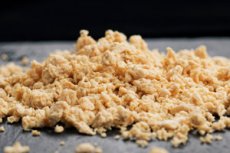ประโยชน์ของไมโคโปรตีนในความผิดปกติของการเผาผลาญไขมัน
ตรวจสอบล่าสุด: 07.06.2024

เนื้อหา iLive ทั้งหมดได้รับการตรวจสอบทางการแพทย์หรือตรวจสอบข้อเท็จจริงเพื่อให้แน่ใจว่ามีความถูกต้องตามจริงมากที่สุดเท่าที่จะเป็นไปได้
เรามีแนวทางการจัดหาที่เข้มงวดและมีการเชื่อมโยงไปยังเว็บไซต์สื่อที่มีชื่อเสียงสถาบันการวิจัยทางวิชาการและเมื่อใดก็ตามที่เป็นไปได้ โปรดทราบว่าตัวเลขในวงเล็บ ([1], [2], ฯลฯ ) เป็นลิงก์ที่คลิกได้เพื่อการศึกษาเหล่านี้
หากคุณรู้สึกว่าเนื้อหาใด ๆ ของเราไม่ถูกต้องล้าสมัยหรือมีข้อสงสัยอื่น ๆ โปรดเลือกแล้วกด Ctrl + Enter

หากผลิตภัณฑ์ที่มี mycoproteins ถูกใช้เป็นเวลาหนึ่งเดือนแทนที่อาหารเนื้อสัตว์เป็นไปได้ที่จะลดเนื้อหาของคอเลสเตอรอลที่ไม่เอื้ออำนวยในเลือดของคนอ้วนหรือ hypercholesterolemic เอฟเฟกต์ที่คล้ายกันสามารถทำได้เช่นโดยเปลี่ยนไปเป็นมังสวิรัติ เกี่ยวกับงานใหม่ของพนักงานของมหาวิทยาลัยอังกฤษแห่งเอ็กซีเตอร์ - เพิ่มเติมในบทความของเรา
โรคหัวใจและหลอดเลือดได้รับการยอมรับว่าเป็นหนึ่งในสาเหตุที่พบบ่อยที่สุดของผลลัพธ์ที่ร้ายแรง ในบรรดาปัจจัยเสี่ยงที่สำคัญคือระดับน้ำตาลในเลือดหรือระดับอินซูลินที่สูงขึ้นความอ้วนขององศาต่างๆและ ภาวะไขมันในเลือดสูง เมื่อคำนึงถึงสิ่งนี้มาตรการป้องกันที่แนะนำเพื่อป้องกันความผิดปกติของการเผาผลาญหัวใจและไขมันคือการออกกำลังกายและการแก้ไขทางโภชนาการ
นักโภชนาการได้เสนอการเปลี่ยนแปลงอาหารโดยรวมถึงผลิตภัณฑ์ mycoprotein ในอาหารแทนที่เนื้อสัตว์ด้วย นักวิทยาศาสตร์วิเคราะห์ผลของผลิตภัณฑ์ดังกล่าวต่อตัวชี้วัดของเศษคอเลสเตอรอลที่รู้จักทั้งหมดและค่าการวินิจฉัยอื่น ๆ ในผู้ป่วยผู้ใหญ่ที่มีดัชนีมวลกายสูงและระดับสูง ระดับคอเลสเตอรอลในเลือด
MyCoprotein เป็นผลิตภัณฑ์ที่มีปริมาณโปรตีนและเส้นใยที่สูงขึ้น มันได้มาจากการหมักของเชื้อรา Ascomycete fusarium
นักวิทยาศาสตร์ทำการทดลองที่เกี่ยวข้องกับอาสาสมัครมากกว่าเจ็ดสิบคน ในบรรดาผู้เข้าร่วมมีผู้ชายน้อยกว่าสามสิบคนและตัวแทนหญิงมากกว่าห้าสิบคนซึ่งอายุเฉลี่ย 41-45 ปีและดัชนีมวลกาย - จาก 32 ถึง 34
ผู้เข้าร่วมทั้งหมดถูกสุ่มแบ่งออกเป็นสองกลุ่ม ตัวแทนของกลุ่มแรกแทนที่อาหารเนื้อสัตว์ด้วย mycoproteins ในอาหารของพวกเขาในขณะที่กลุ่มที่สองยังคงบริโภคผลิตภัณฑ์เนื้อสัตว์และปลา
ก่อนการทดลองผู้เข้าร่วมทุกคนได้รับการทดสอบการวินิจฉัยการตรวจเลือดเพื่อประเมินตัวบ่งชี้คุณภาพของการเผาผลาญไขมัน
ตัวแทนของกลุ่มแรกบริโภคอาหารที่อุดมไปด้วยโปรตีนและไฟเบอร์เป็นเวลาหนึ่งเดือน เมื่อการทดลองสิ้นสุดลงผู้เข้าร่วมจะได้รับเลือดของพวกเขาอีกครั้งเพื่อทดสอบและวัดค่าดัชนีมวลกายของพวกเขา ผู้เชี่ยวชาญพบว่าคนที่กิน mycoprotein (ประมาณ 180 กรัมต่อวัน), คอเลสเตอรอลที่ไม่พึงประสงค์ลดลงมากกว่า 10% - ประมาณ 0.3 mmol ต่อลิตร ผลกระทบสามารถนำมาเปรียบเทียบกับผลของยา: ตัวอย่างเช่นการใช้สเตตินในปริมาณมาตรฐานนำไปสู่การลดลงของตัวบ่งชี้นี้ 0.3-1.3 mmol ต่อลิตรหลังจากหนึ่งปี
เหนือสิ่งอื่นใดผู้เข้าร่วมในกลุ่มแรกมีระดับน้ำตาลในเลือดลดลงมากกว่า 10% และลดลงเกือบ 30% ใน c-peptide ระดับเมื่อเทียบกับกลุ่มที่สอง
เป็นที่ทราบกันดีว่าการทำให้เป็นปกติของความเข้มข้นของคอเลสเตอรอลที่ไม่เอื้ออำนวยช่วยลดความเสี่ยงของโรคหัวใจตลอดชีวิต การปฏิเสธอาหารเนื้อสัตว์ในความโปรดปรานของผลิตภัณฑ์ mycoprotein ช่วยให้มีความเสถียรของเนื้อหาของค่าพื้นฐานของการเผาผลาญไขมันอย่างรวดเร็วและปรับปรุงระบบหัวใจและหลอดเลือดโดยไม่ต้องใช้ยา
เรียนรู้เพิ่มเติมที่ แหล่งที่มา
